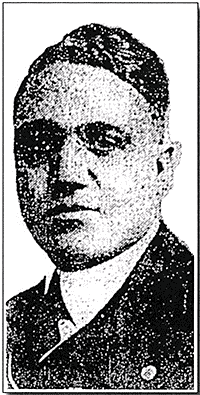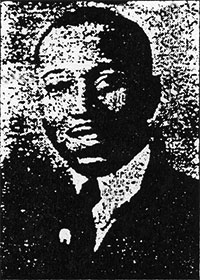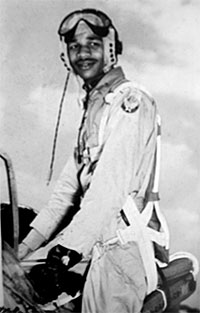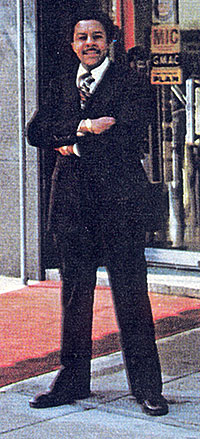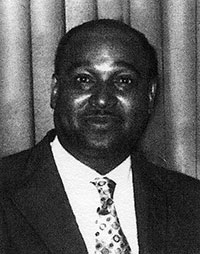The Pioneers
The Men
Homer B. Roberts
Dan Gaines
Ed Davis
Robert H. Nelson, Jr.
Robert Neal
C. G. Hairston
Al Johnson
Homer B. Roberts
(1923 Kansas City - Hupmobile)
There is little doubt that Homer B. Roberts was truly an extraordinary man with a multitude of talents, both in business and in the military. Born in 1885 in a small rural community outside of Springfield, Missouri, he was well educated, receiving a degree from Kansas State Agricultural College. It is known that he also spent time at the Tuskegee Institute. In the early 1900's, it is recorded that he worked in the retail car business, but no other specifics were located.
With the start of World War II, Roberts enlisted (1917), believing it 'was an honor for individuals of the Negro race to fight for and protect the country." He served in France in some of the heaviest battles (Argonne) and was commissioned a First Lieutenant in the Signal Corp., the first of his race to receive such a rank.
When he returned to Kansas City in 1919, Roberts began brokering new cars within the black community. The white dealers provided him the opportunity, believing that "blacks could best sell to blacks" and sales would be incremental.
Roberts understood the power of advertising and began purchasing ads in The Kansas City Sun, the local and then prominent African-American newspaper. His advertisements were 'cutting edge' efforts for the times and his business grew. In 1921, he acquired new sales offices and hired two salespersons to meet the growing demands of his business.
Roberts made history in 1923. Believing he needed larger facilities to service his businesses, he had constructed a 9,500 square foot building which he called the Roberts Company Motor Mart. This facility not only serviced his car operation, but provided additional retail space for black-owned businesses – one of the first retail shopping centers in the country.
With his success, many small, niche manufacturers entered into sales agreements with Roberts. Such auto companies were Hupmobile, Rickenbacker, Whippet, and Marmon. He also had a distributorship arrangement with a local Oldsmobile dealer. He advertised heavily in The Kansas City Call, the then dominant African-American newspaper in Kansas City. He remained in business at this location until 1929.
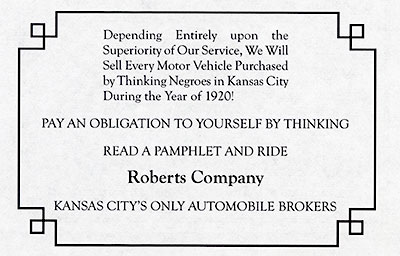
There are no findings as to why Roberts decided to move to Chicago in 1929 with two local business associates (Kenneth E. Caldwell, Jr. and Thomas J. "Big Piney" Brown, both African-Americans), where they opened the Roberts-Campbell Motors Company, which featured Hupmobile. Brown managed the Kansas City operation for a short period but subsequently it was sold and soon after closed.
It is believed that the Chicago operation remained in business only for a short period. With the closing, Roberts sought and obtained sales work from local white dealers who were aggressively seeking out black consumers.
In 1941, at the age of 56, Roberts re-joined the military and spent four years in the Army during World War II. He was discharged with honors and returned to Chicago where he worked in media/public relations until his death in 1952.
This brief summary does not do justice to the extraordinary business talents of Roberts, but it can be well documented that he was one of the first African-American retailing giants. For those interested in learning more about Homer B. Roberts, a book detailing his business life can be purchased from:
Dan Gaines
(1936 Chicago - Ford)
In the research conducted in Chicago, some information was discovered about the business life of Dan Gaines. It is known he was born in Tennessee and the family moved to Chicago sometime in the 1920s. As referenced earlier, there were advertisements in The Chicago Defender announcing the Grand Opening of Dan Gaines Motor Sales (Authorized Ford Dealers-August-1936) located at 4533-41 Cottage Grove.
Such advertisements had been noticed by Nathan Thompson that led to the research to determine which African-American was the first to be awarded a new car franchise.
It is evident that business was good. In July of 1937 Gaines moved into larger facilities at 5025 Wabash Avenue where he remained in business until 1940. As you tour the existing facility structure, it can be concluded that Gaines had sufficient space for both new/used car sales and adequate service capacity. His staff was African-American and focused on selling into the black community.
Although there is no confirmation within the Ford Motor Company franchising files, there is sufficient evidence to confirm that Gaines was an authorized Ford dealer. In all of his many advertisements published in the Defender in the late 1930's, he often referenced the fact that he was "America's Only Authorized Race Ford Dealer".
As you review his advertisements, you note the pictures of the facilities included Ford authorized signage which would have required company approval. His ads often were those prepared by the company for insertion in local press and his statements about race support were 'true' based on available records.
Importantly, if he had not been authorized, some of the 60 Ford dealers in the Chicago market would have strenuously objected to his marketing into areas in which they also sought business. Putting it all together, it can be concluded Dan Gaines was the first franchised Ford dealer.
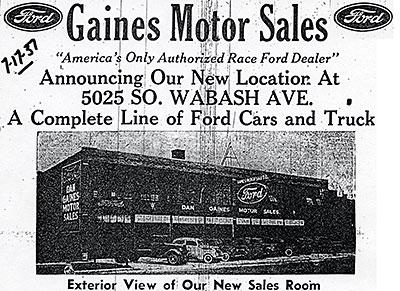
It was also noted that Gaines invested in numerous other business enterprises. For example, he operated a loan company for many years and was in the real estate business. Research confirms that he owned a hotel on the Southside of Chicago and sold and serviced juke box machines in local bars and restaurants. As a result of the latter, Gaines was often referred to as the "Juke Box Man". As stated, although not much was written about Dan Gaines, it can be documented he was a man of diverse and extensive business talents.
When Gaines died at the age of 92, his Death Certificate identified his "Usual Occupation" as "Retired" (typed in). "Retired" was crossed out and replaced with the hand-written word "Merchant". In the box showing "Type of Business" was "Self Employed". It is suggested these descriptions well describe the business talents of Gaines. It is also appropriate to conclude just that: Dan Gaines was a successful entrepreneur who achieved considerable business success in a variety of enterprises, including the retail car business as a Ford dealer.
Ed Davis
(1940 Detroit - Studebaker)
It was special meeting with and extensively interviewing Ed Davis; an icon among African-American business entrepreneurs. When we met in his office located in the Penobscot Building (downtown Detroit) which he retained for many years after he had left the retail car business, or at his home (with his wife, Mary Agnes), he discussed in great detail the long journey from his roots in Shreveport, Louisiana (1911) until his decision to retire as a Chrysler-Plymouth dealer in Detroit in 1971.
Ed Davis had not accumulated the kind of wealth that many successful car dealers had due to product, timing, market conditions and other factors. But it was evident that he understood the importance of his tireless effort to open doors for other African-Americans, not only in the automotive sector, but in government and other business entities as well.
When Ed Davis and his family arrived in Detroit in the early 1930's, he found work at local garages and eventually went to work in the local Dodge factory. It was there he made contact with a local dealer and began to sell cars as a "bird dog".
Eventually, because of his success, he was given an office on the second floor of the dealership but the constant race issues and other pressures from the dealership employees caused Davis to move out on his own.
Scrapping up every cent he had, Davis located a facility at 421 East Vernon Highway in Detroit and Davis Motor Sales, Inc. became a reality on December 4, 1939. With a small staff, Davis pursued the used car business and brokered new cars. It was at this time that the local Studebaker dealer for the Detroit market concluded that Davis could sell incremental units for him and in 1940, Ed Davis made history – he was awarded the Studebaker franchise.
With less than a desirable product line, a highly competitive market, and being excluded from the 'club', Davis struggled. Studebaker was in a tailspin and finally, in 1955, closed its doors. Davis remained in the used car business and sought out the Big Three but the answer was always the same; "we have nothing, we'll call you when we do."
In 1957, Davis became a sub-dealer for the local Ford dealer (Floyd Rice) which lasted for about two years. But, again, because of racial issues, he was constantly under considerable pressure. As a result he returned to selling used cars.
In 1963, while attending a newspaper media event, Davis was introduced to Chrysler management. The decision was made to appoint Davis as a dealer at a location within the confines of the city of Detroit. A market area was carved out that was primarily African-American with low income and an unemployment rate of 45 percent. But Davis knew the market and believed he could be successful.
On November 11, 1963, Ed Davis was appointed a Chrysler-Plymouth dealer, the first African-American to be awarded a Big Three franchise in the post World War II era. He remained in business until 1971. Faced with labor problems, a tough competitive environment and financial problems, he resigned.
Following his retail business, Davis immersed himself into a number of community activities, particularly Detroit's Department of Street Railroads. During this period, he wrote three books about his automobile experiences; "One Man's Way – An Autobiography (1977)", "A Dilemma of Equality in the World of Work-(1985)", and "Who's Innocent – The Automotive Market (1988)", which may be available from the Charles H. Wright Museum of African-American History in Detroit.
As has been noted, Davis received numerous awards and honors for his professional and personal achievements over the years. In 1969, he was the first African-American to receive Time Magazine's Quality Dealer Award. In 1996, for his business and community services and his contributions spanning a period of 30 plus years in the retail business, Ed Davis was the first African-American to be selected as a member of the industry's Automotive Hall of Fame.
Ed Davis was an icon with considerable entrepreneurial skills, a distinguished African-American pioneer.
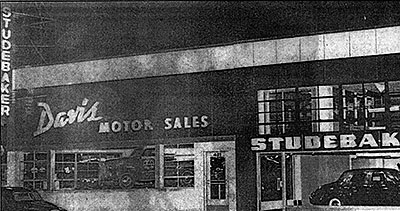 Davis Motor Sales opened for business in 1939.
Davis Motor Sales opened for business in 1939.
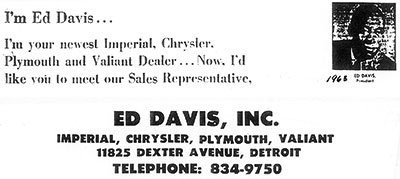
Robert H. Nelson, Jr.
(1961 Chicago - MG/Peugeot)
Little has been written about the exploits of Bob Nelson but in the articles which are available, one finds extraordinary achievements, both in the military and in the car business. Born in Pittsburgh, Nelson joined the Air Force in the early 1940's, but like all blacks interested in flying at the beginning of World War II, they were not allowed to do so.
Subsequently, the Air Force established its own, but separate, "Black" air force, the now well-known Tuskegee Airmen. Nelson received his wings in 1943 and was assigned to the 332 Squadron. During combat in Italy in the 1940's, Nelson, in a P-39, flew a total of 130 missions and received numerous decorations. For those interested in reading more about the "Black Knights", a book published by Homan and Reilly is recommended.
After World War II, Nelson attended the University of Pittsburgh and received a Bachelor of Science degree. With the Korean War in progress, he was then brought back into the Air Force where he flew 66 combat missions. After being discharged, Nelson moved to Chicago where in the late 1950's, he opened a repair and service business located at 6052 S. Cottage Grove Avenue.
After building a reputation, he was approached by niche foreign auto manufacturers, MG and Peugeot. With a minimum investment, Nelson was awarded their franchises. He also acquired the Honda Motorcycles franchise.
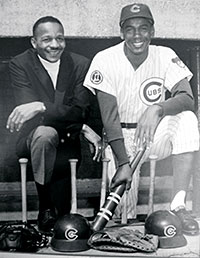 Because of his experience and auto retail background, an opportunity presented itself in 1967. Ford Motor Company was looking for a replacement for the Ford dealership located at 7626 S. Stony Island Avenue on the Southside of Chicago. The decision was made to team up Nelson with the legendary Chicago Cub, Ernie Banks.
Because of his experience and auto retail background, an opportunity presented itself in 1967. Ford Motor Company was looking for a replacement for the Ford dealership located at 7626 S. Stony Island Avenue on the Southside of Chicago. The decision was made to team up Nelson with the legendary Chicago Cub, Ernie Banks.
On August 1, 1967, Nelson-Banks Ford Sales, Inc. became a reality. With Banks' reputation and Nelson's business acumen, it was concluded the partnership would be ideal for the market. However, in spite of reasonable sales volumes, a declining market and an increasing cost of doing business forced Nelson-Banks to resign (1971).
Ford Motor closed the dealership. The partnership had operated under Ford's Dealer Development Investment Plan and their investments were returned. In 1974, Nelson was appointed the Chevrolet dealer in Maywood, Illinois and operated the dealership for several years. He then acquired a Wynn's Parts-Service franchise which he managed until his death in 1984.
History will record that Robert H. Nelson, Jr. was a 'top gun" in the air force and a successful 'risk taker' in the world of business.
Robert P. Neal
(1962 Chicago - Triumph)
In his twenty four years in the retail car business, Bob Neal achieved a number of firsts and special distinctions. As you review his business career, it is evident that Bob Neal was a 'risk taker' with excellent instincts for business.
Born in Texas, he attended Houston Tillison College in Austin, Texas where he graduated in 1954. After serving two years in the military, Neal moved to Chicago and held a number of jobs; e.g. drove a bus, school teacher etc. But with the influx of import vehicles, he believed there would be a need to service these 'unique' vehicles and decided to open a service repair operation with a focus on Renaults.
Sometime in early 1962, Neal was contacted by British Car to determine his interest in representing them (Triumph) in his market. With a total investment of $20,000, Bob Neal opened Chatham Motors at 7700 Cottage Grove on the Southside of Chicago. Although the volumes were small, it provided credibility to his operation.
It is a well known proverb that 'success breeds success' and so it was with Bob Neal. Subsequently, he was contacted by Toyota which was having difficulty in finding existing dealers to represent them because of their product reputation and the fact they were an import .
After a visit to Japan, Neal stated that "Frankly, I was impressed with what they were doing, and decided to give it a shot, one of the best decisions I ever made." In August 1967, he was awarded the Toyota franchise, the first African-American to have done so. With the energy embargo of 1974, the country turned to fuel efficient vehicles. Toyota cars were in high demand and Bob Neal was well positioned to meet the needs of his consumer base.
In July of 1973, when he learned the Pontiac dealership in his area was available, Neal acquired it and dualed it with his Toyota operation. Although both GM and Toyota were not happy with this decision, he realized it was the only way to maximize his profit opportunities – and he did just that with his many import lines.
In 1976, he was offered the Jaguar franchise and took it. Again, very small volume but helped build the reputation of his business. And in 1978 when Dodge became available, Neal acquired that franchise also. At the same time with the growing interest in import franchises, Neal took on a number of niche import makes, e.g. Simca, Sunbeam, Roots Group.
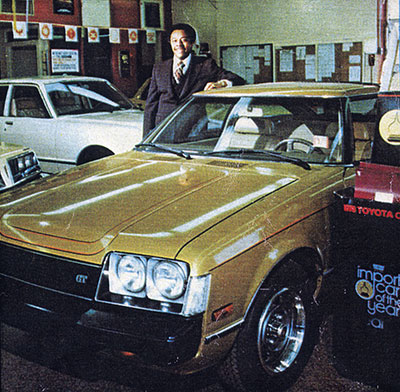
The next major acquisition occurred in February 1979 when he acquired Honda. This enabled him to purchase a second facility on Stony Island which he named Competition Motors. He was the first African-American to represent Honda albeit by only thirty days as the Wilson's in Detroit received a Honda franchise in March of 1979.
With operating businesses that required a 24-7-365 commitment, and having achieved considerable success, Bob Neal sold his franchises over a two year period (1985-1986). After 24 years in the car business, it was time to move on.
History will record that Robert P. Neal was the first African-American car dealer to become a multi-franchised dealer in the post World War II era at a time when African-Americans were just beginning to make inroads into the retail car business.
C. G. Hairston, Sr.
(1966 Danville Va. - Fiat)
Curnel George Hairston, known as "C. G." among friends and associates, has the distinction of being the longest tenured African-American new car dealer having spent more than 40 years being a dealer principal. Very little, if anything, has appeared in the black media about his successful endeavors, but when interviewing "C. G.", you understood that his reputation of having a 'bull dog' attitude about business was recognizable. It was evident that he just went about his business in spite of racial and other issues negatively impacting his business.
Born in Cascade, Virginia, Hairston joined the Army and upon his return, he made the decision to go into the used car business. He was 22 years of age. In the Spring of 1955, he obtained a used car license and with $1,000, began selling used cars in both Cascade and Danville. Hairston remembers vividly that "every time I would drive one of my cars to a customer in Danville, I would be pulled over by the local police wanting to know where I had gotten the car." It was part of the normal pressures a black had to endure doing business.
Nevertheless, business was growing and as a result, in 1959, Hairston opened a second lot in Danville. Over a period of time, he realized that it would be beneficial to consolidate both operations and in 1963, he located a building in Danville which included a showroom and service stalls. There was sufficient land to hold an expanded used car inventory.
In 1966, Hairston was contacted by Fiat. He concluded that for an investment of $6,000 for signs and parts, it was worth the risk and subsequently signed their sales and service agreement. Although Fiat was not a car that had great sales appeal in Danville, having a new car franchise helped his image in the market.
But the next step was an important one. When the Volvo representative for the general area contacted him in 1970 about adding Volvo to his operation, Hairston elected to do so and retained the franchise for more than 30 years. Volvo had a sound reputation and again, the incremental gross and service business helped benefit the dealership. Although Fiat and Volvo were small volume lines, they gave 'Hairston Motor Sales" an up scale reputation in the Danville market that complimented his used car business.
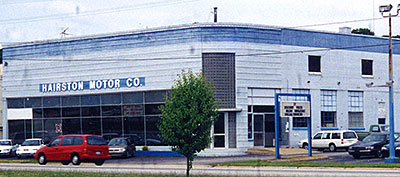
During this period, C. G.'s son, Gary, joined the business and has been an integral part of the business for many years. Also, using the dealership as the base, Hairston invested in a number of other business activities; e. g., real estate, a radio station, and an oil company. He noted that all endeavors were within the Danville general area which enabled him to keep close contact with all his businesses.
When asked the secret to his success, Hairston responded by saying that his motto was rather simple: "I tell my customers that I'm going to sell you a good car, I'm going to give you good service, and I'm going to make a little money doing it." It worked for C. G. Hairston, an African-American new car pioneer.
Albert Williams Johnson
(1967 Chicago - Oldsmobile)
Al Johnson was a giant among African-American new car dealers and helped open doors for many others to follow. For twenty-eight years, he was both an Oldsmobile (1967-1971) and Cadillac (1971-1995) dealer, the first African-American to hold both of these GM franchises. His story is one of perseverance and vision and 'making a difference' in a number of areas for black dealers who followed.
Born in St. Louis, Johnson acquired a degree in hospital administration. Believing he could make more money pursuing other business opportunities, he turned to the new car business. In 1954, he was hired by Noting Oldsmobile in Kirkwood, Missouri on the basis that "I could not sell from the dealership but would have to sell within the community" Again, the belief being held by the white dealer that "blacks could best sell to blacks." He was not permitted to sell from the dealership premises.
Johnson accepted the challenge. It wasn't long before Johnson earned the reputation of being the 'salesman who sold from a briefcase" and he was highly successful in doing so.
With continuing personnel and racial problems at the dealership, Johnson moved to Brock Oldsmobile in 1962 and continued his selling practices. It was here, he met representatives from Oldsmobile Division who encouraged him to stay in the business. With this support, Johnson concluded that it would be just a matter of time before African-Americans would get the chance to become dealers. He was going to be ready when it happened.
The year was 1967. Johnson was contacted by the Chicago Oldsmobile Regional Sales Office and he was offered the opportunity of replacing Ray Oldsmobile located at 74th & Halstead in Chicago. Although the dealership had been losing money, it was believed that Johnson, with his 14 years of selling, could make it work. Johnson agreed. On August 1, 1967, Al Johnson became the first African-American to be awarded a new car franchise by GM (Oldsmobile).
After rebuilding the dealership organization and making it successful, Johnson was offered the opportunity of becoming the Cadillac dealer in downtown Chicago, an opportunity he couldn't pass up. On June 1, 1971, he was officially franchised. (It is appropriate to note that the replacement for Johnson at his Olds dealership was another African-American, Rufus Dukes, who was also successful.)
Within a short period of time, Johnson received permission to relocate his Cadillac operation to Tinsley Park, about 20 minutes from his existing location, where he built state-of-the-art facilities on five and half acres of prime property. He remained there until 1995 when he sold the Cadillac business concluding 41 years of selling cars and trucks (23 as a salesman and 18 as a dealer).
Importantly, Al Johnson also made a number of major contributions while he was a dealer. He was a primary catalyst for industry African-American dealers coming together in 1970 to establish the first minority dealer organization (NBADA). Working with GM management, he suggested the need for minority dealer training.
This lead to the establishment of GM's Minority Dealer Training Academy, an 18 month training program, which provided minorities a compacted view of the retail business. This training concept, launched in June of 1972, became the standard in the industry.
In 1974, Johnson was recognized by Time Magazine as one of the top dealers in the country and honored with its prestigious Quality Dealer Award. And lastly, his involvement in numerous business and philanthropic aspects of the Chicago community are extensive - Al Johnson gave back to the "Windy City" community which had supported him as a dealer.
When one reads the full business life experience of Albert Williams Johnson, you recognize that he was truly an African-American business icon - an individual who made a difference.

